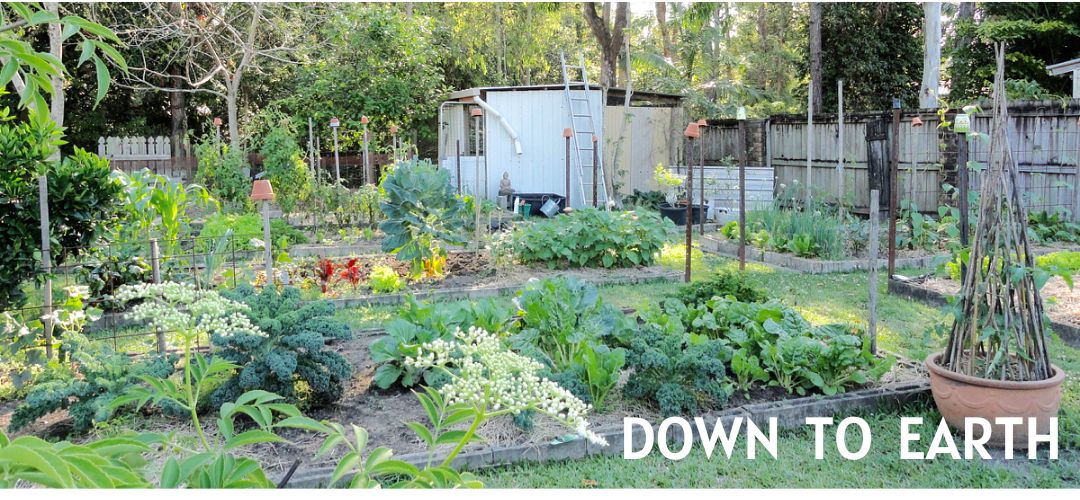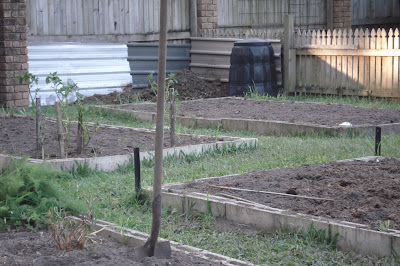There is one thing you can do that will improve your harvests and the quality of your produce more than any other - enrich your soil before you start planting. There is an old gardeners saying that is as true today as it was when it was first said: Feed the soil, not the plant. Garden soil is not just rock particles, organic matter, water and air; good soil also contains microbes, fungus, worms, nematodes and a range of other "life" that hasn't yet been identified. Good soil is alive.
The garden yesterday afternoon after Hanno had been working there for a few days. (Click on photos to enlarge.)
If you're starting off with mediocre soil that has been struggling to produce food in previous years, or has never been productive, the one thing I urge you to do it to work on your soil before you even think about planting. That one thing will make more difference than anything else you do. When we started vegetable and fruit gardening in our backyard 13 years ago, the soil here was undisturbed heavy clay. We started by enriching the soil and making compost. Then we planted various plants directly into bucket size pockets in the soil that we filled with compost. We had small yields during those first years, but eventually, with continued additions of compost and whatever other organic matter we could find, such as lawn clippings and manure, we eventually turned our almost sterile soil into a fertile oasis.
Quentin has recently started laying.
We are not no-dig people. We dig our garden. We believe you get the best crops and the full measure of your soils - with all the nutrients and minerals they can provide, if you plant directly into the top soil. If you can keep your topsoil alive by adding worm castings, worm juice, manures and well made compost, you'll be giving whatever you plant the best chance of producing maximum crops.
After the beds were dug over and weeded, Hanno moved the perennial Welsh onions to their new growing space for this year - the top garden bed near the bird bath.
So if you're thinking of starting a garden this year, you need to work on two things - making compost and enriching your soil. I will write about compost tomorrow. Even if you've been working on your soil for a while, you need to do it every year. Each year you plant, that crop of plants will use the nutrients you add to the soil. This is a continuing task to be carried out every year - add more organic matter and enrich the soil.
Some plants are still growing well. Above you can see eggplant and pumpkins, along with an orange tree and passionfruit vine that self seeded and is now growing vigorously along the picket fence.
If you've never planted anything in your garden before, you'll need to know the pH level of your soil. This is the level of acidity/alkalinity in the soil. Some plants like a more acid soil, some like it more alkaline but the vast majority of plants will grow well in the range pH 5 - 7. If your soil is too acid, add agricultural lime to help balance it out. If it is too alkaline, add compost and organic matter. Clay soil can be corrected over time with the addition of gypsum at about 500 grams (1 pound) per square metre. If you are blessed with good fertile soil you won't have to bother with all this palaver but the majority of us will have poor soils that we have to work on.
The girls on their daily gardening expedition. This picture was taken about two weeks ago before Hanno started cleaning up for this season's crops.
So if you're starting from scratch, your first step is to dig your soil over and test it for pH. Make the necessary adjustments, if needed, and water the soil. You are trying to encourage microbes and worms to live there and it must be moist and nutritious for that to happen. As soon as you start adding compost and other organic matter like manure, and if you keep the soil moist, the worms will come from no where. They will further help you break up the soil because they'll burrow through it making tunnels for water and nutrients to flow. They will eat and excrete and over time, will help develop the life in your soil.
Some plants, like comfrey, send down deep tap roots that mine the soil for minerals. Those minerals are stored in the leaves of the plant and when you use something like comfrey for fertilising or activating your compost, you'll get the benefit of the high nitrogen leaves and the minerals they contain. So it is a good idea to plant comfrey at the edges of your garden so you have a regular supply of high nitrogen and mineralised fertiliser. Comfrey will grow in poor soil but it likes moisture so pick a spot where the water collects - make sure it's not a prime vegetable growing space, and plant your first bits of comfrey. It grows well from roots. Make sure of your place because once planted, it's difficult to get rid of it.
The chooks love getting into the garden - during the normal growing season they're fenced off from the vegetables.
If you have chooks, let them into the garden while you're building up the soil. They'll scratch around, leave their droppings, eat bugs and insect eggs that you can't see and generally improve the fertility of the soil simply by being there. We let our chooks into our garden over the past two months. They've eaten the comfrey down to the roots, picked all the leaves from the capsicums (peppers), turned over the compost heap several times and eaten every caterpillar and grasshopper in the place. We don't worry about this damage, the leaves will grow back and the chooks do much more good than harm. Because of their hard work, we are starting off our gardening year with a clean slate. When you plant seedlings and have your garden in full production, you'll have to keep the chickens out of your garden. We do this by fencing off the vegetable garden from the rest of the garden the chickens usually free range in.
Just to recap:
- Dig the soil over and remove the weeds
- Test for pH
- Make the necessary adjustments (see above)
- Water the soil and keep it moist
- Fence the garden off from chickens and pets
- Let the chickens in to scratch and feed during this period of soil enrichment
- Add compost and organic matter like cow, horse, pig, sheep manures.
Tomorrow we'll discuss compost and how to make it from what you have at home.






